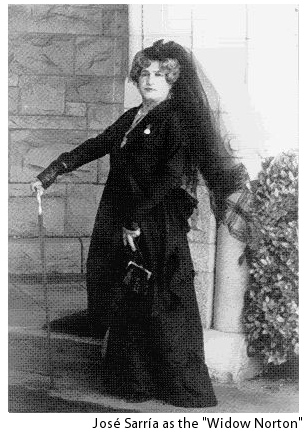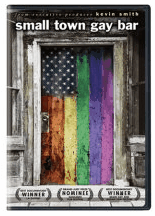Jesse’s Journal by Jesse Monteagudo
Children of the Black Cat
 One of the highlights of the 1984 documentary film "Before Stonewall" was a filmed reunion of the staff members and patrons of the Black Cat Café, a "bohemian" bar that flourished on Montgomery Street in San Francisco. Today the Black Cat, which finally closed in 1963 after 30 years of service, is best-remembered as the place where drag entertainer José Sarría became famous. Sarría, who was an activist as well as a performer — in 1961 he was the first openly Gay person to run for the San Francisco Board of Supervisors — often spiced his routines with gay rights messages and always ended his shows by leading his audiences in vivid renditions of "God Save Us Nelly Queens." At the reunion, Sarría and other Black Cat veterans reminisced about how the Café served them as a home away from home, a support group, and a family of choice. Whether they be women or men; blacks, whites or Latinos; middle-class or working-class, the Black Cat brought them together and made them a community
One of the highlights of the 1984 documentary film "Before Stonewall" was a filmed reunion of the staff members and patrons of the Black Cat Café, a "bohemian" bar that flourished on Montgomery Street in San Francisco. Today the Black Cat, which finally closed in 1963 after 30 years of service, is best-remembered as the place where drag entertainer José Sarría became famous. Sarría, who was an activist as well as a performer — in 1961 he was the first openly Gay person to run for the San Francisco Board of Supervisors — often spiced his routines with gay rights messages and always ended his shows by leading his audiences in vivid renditions of "God Save Us Nelly Queens." At the reunion, Sarría and other Black Cat veterans reminisced about how the Café served them as a home away from home, a support group, and a family of choice. Whether they be women or men; blacks, whites or Latinos; middle-class or working-class, the Black Cat brought them together and made them a community
Though the Black Cat was the best known LesBiGay bar of the 1950’s, it was by no means the only one of its kind. At a time when community groups were few and far between, bars often served as community centers. "For Gay men and Lesbians, the centrality of bars to community life has probably been truer than it has for any other group," wrote Matthew D. Johnson and Claude J. Summers in glbtq.com.
"In addition to providing opportunities for glbtq people to socialize and to meet potential partners, Gay and Lesbian bars have offered members of a stigmatized social minority, often isolated from one another, an opportunity to inhabit space with like-minded folk. Until recently, they were often the only venues in which glbtq people could feel free to be openly gay."
There is hardly a Gay memoirist of the 1940’s or 1950’s who does not recall a favored Gay watering hall, as did the late Ricardo J. Brown in his book The Evening Crowd at Kirmser’s; a gay bar in 40’s St. Paul, Minnesota. Brown’s fond memories are echoed by those of other lesbian and gay members of "the greatest generation."
 Even today, Lesbian and Gay bars play an important role in the lives of many Lesbian, Gay, bisexual and transgender people. This is especially true in small towns and rural areas that lack community centers and other supportive groups. In the recent film documentary Small Town Gay Bar, Gay bars play an important role in the lives of GLBT people who live in rural Mississippi. To the people who frequented Rumors in Shannon and Crossroads in Meridian, bars were more than just places to drink, dance or cruise. They were havens for persecuted minorities and unique opportunities to be open and honest within an oppressive social climate. The brutal hate crime death of Scotty Weaver, an event that was also featured in Small Town Gay Bar, only reminds us of the dangers of being a queer person within the buckle of the Bible belt.
Even today, Lesbian and Gay bars play an important role in the lives of many Lesbian, Gay, bisexual and transgender people. This is especially true in small towns and rural areas that lack community centers and other supportive groups. In the recent film documentary Small Town Gay Bar, Gay bars play an important role in the lives of GLBT people who live in rural Mississippi. To the people who frequented Rumors in Shannon and Crossroads in Meridian, bars were more than just places to drink, dance or cruise. They were havens for persecuted minorities and unique opportunities to be open and honest within an oppressive social climate. The brutal hate crime death of Scotty Weaver, an event that was also featured in Small Town Gay Bar, only reminds us of the dangers of being a queer person within the buckle of the Bible belt.
Much has been written recently about the decline of GLBT bars, most notably in an excellent, in-depth column by journalist Paul Varnell. But we must never underestimate the impact taverns have in our communities. We don’t have to go to rural Mississippi to find a bar where, like TV’s Cheers, everyone knows your name. To many of us, a beloved neighborhood bar is a second home and the people who work or play there form the family that we never had. Because of this, the closing of a Suncoast Resort in St. Petersburg or a Full Moon Saloon in Orlando (to name two Florida attractions) is rarely pure and never simple. To many of us, it is as if a loved one has passed away.
Of course bars are businesses first and foremost, not community centers or social services. Even the original owners of Rumors and Crossroads had to sell when their bars were no longer profitable, no matter what their customers needed or wanted. Home Depot gave the owners of the Suncoast Resort an offer that they could not refuse; while the owner of the Full Moon Saloon simply burned out. When push came to shove, the needs and desires of the patrons, the employees and the community at large did not matter one bit.
On the other hand, we should not be too critical of the bar owners who, like you and me, are only trying to make it in a cruel world. For every bar owner who looked out for number one there were many proprietors – like the owners of the Black Cat – who risked all to serve their community. There are countless GLBT and AIDS charities that survive thanks to the generosities of gay bars, their owners, staff and patrons. In spite of it all, for every bar that closes, another one often comes along to take its place. Even in rural Mississippi, Rumors now flourishes under its new owners while Crossroads enjoys a new life as Different Seasons. There is still a need in our community for places where we can relax and be ourselves; and this is a service that our bars do so well. Fifty years after the heyday of the Black Cat Cafe, it’s children continue to do what they do well, and we are much better for it.